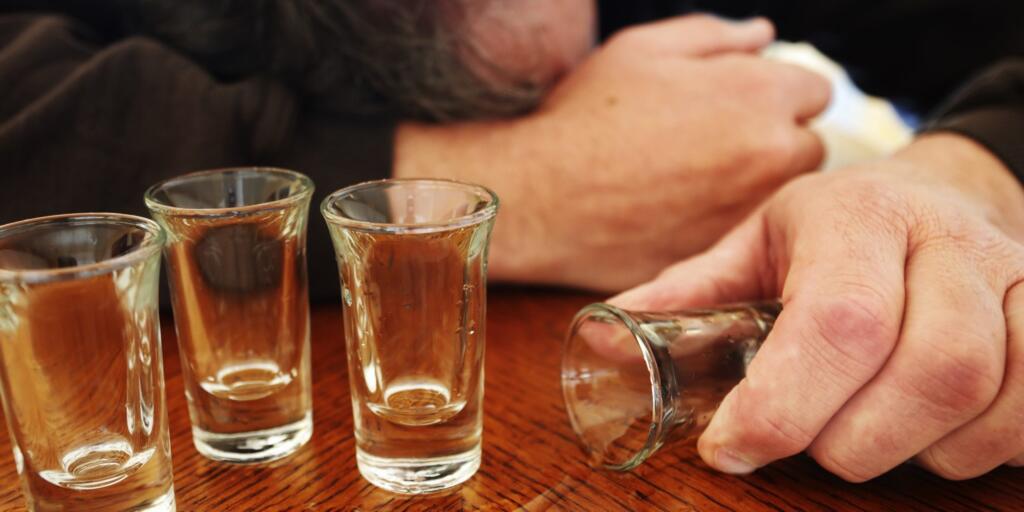Am I an Alcoholic? Self-Assessment Questionnaire
Our self-assessment alcohol questionnaire walks you through some of the factors that healthcare professionals use to diagnose addiction.
When going through the self-assessment questions, note how many receive a “yes” answer:
2-3: A mild substance use disorder could be diagnosed.
4-5: This indicates a moderate substance use disorder.
6 or more: Addiction or another type of severe substance use disorder is likely.
If only a few answers are “yes,” this doesn’t mean there isn’t a problem. Continued alcohol abuse by those with a mild alcohol use disorder can lead to more severe symptoms and a later diagnosis of alcoholism. Any potential substance use disorder should be taken seriously.
1. Do I regularly drink more than I plan to?
Many people can casually drink at a party, having one or two drinks over a few hours and then stop. However, people struggling with alcohol abuse or alcoholism might find they’ve lost track of how many drinks they’ve had. They may also find that they’ve been drinking for several hours without realising it – much longer than they might have intended.
Alcoholism results in a loss of control over drinking.
If a person finds that the amount of alcohol consumed on a regular basis is more than the individual intended to consume, the answer to this question is “yes.”
2. Have I been unsuccessful at quitting before?
Substance use disorders like alcoholism are chronic conditions which, like other chronic medical conditions such as asthma and diabetes, often result in relapse. This means that people who are struggling with alcohol use disorders may attempt to quit using alcohol and ultimately end up relapsing to alcohol addiction one or more times.
It is important to note that continued relapse can present a danger to the individual. Not only can alcohol withdrawal itself result in dangerous symptoms, but relapsing to alcohol addiction can lead to circumstances where overdose – drinking amounts of alcohol that put the person’s health or even life at risk – is more likely to occur. This is because a person’s tolerance for alcohol quickly drops after quitting use; however, when the person returns to use, drinking the large amounts that were consumed before stopping can result in overdose, or alcohol poisoning, where it didn’t previously.
3. Has my drinking interfered with my personal relationships?
Substance abuse can often become a sticking point in relationships. When the amount of alcohol that a person is consuming becomes a concern for loved ones, challenges can arise that include:
- Arguments
- Loss of intimacy
- Betrayal of trust
- Not living up to expectations.
The real hallmark, however, is not just that these things are happening, but that the individual struggling with alcohol addiction cannot stop, regardless of potential negative relationship consequences.
Another effect of alcoholism on relationships is that the person may have a change in social relationships as a result of drinking. Often, the person will begin to gravitate more toward friends who encourage or participate in the individual’s drinking and away from those who are critical of the person’s behaviour. This can be a self-destructive change, decreasing the person’s motivation to stop consuming alcohol.
4. Is my drinking causing health problems, and do I keep doing it anyway?
Long-term effects of alcohol abuse can cause physical and psychological health issues other than alcoholism itself. Physical conditions are caused by alcohol toxicity and the ways alcohol affects how body systems function. Adverse effects on the brain, such as those described by Alcohol Concern have to do with brain damage and alcohol’s effects on brain chemistry. Resulting in mental and physical health problems include:
- Heart disease, heart attack, or stroke
- Digestive issues or conditions, including some cancers
- Liver damage, scarring, cirrhosis, and failure
- Brain damage, cognitive issues, or memory loss
- Depression or other mood disorders
- Worsening anxiety
A person who has been consuming large amounts of alcohol regularly and is seeing these issues develop may find excuses to keep from connecting the problems to alcohol use. On the other hand, the person may simply ignore the connection. However, if physical and emotional issues are known to be connected to drinking, and the person still cannot control alcohol use, alcoholism could be the reason.
5. Do I drink in risky situations?
As mentioned above, people with alcohol use disorders often spend more time drinking than is appropriate, and this may involve drinking in situations where it can be dangerous. This includes drinking before driving, when using dangerous machinery, or before participating in a risky sport or activity.
Alcohol consumption relaxes a person’s usual inhibitions, making it more likely that the person will participate in activities that would normally be avoided. The result can be an injury, illness, or even death as a result of consuming alcohol and taking undue risks on a regular basis.
6. Have the effects of drinking alcohol diminished over time, or is more alcohol required to have the same effect as before?
Regular and heavy substance abuse over time can result in a condition called tolerance, where the effects of alcohol do not seem to be as strong as they were when the person first started drinking. This may manifest as the person needing to have more alcohol to feel the same euphoric effects that used to occur with just one or two drinks.
Tolerance means that alcohol use has begun to disrupt the brain’s chemical pathways, a sign that the brain is starting to become dependent on the presence of alcohol for those pathways to function. This, in turn, is a precursor to alcoholism, and it can continue to occur to a degree after alcoholism has developed.
7. Do I have cravings or urges to drink alcohol?
Many of the above behaviours follow a key symptom of alcoholism: cravings. When the person is not engaging in alcohol use, urges to drink may become uncontrollable, leading the person to seek out an opportunity to drink. Sometimes, these cravings may be triggered by specific situations, such as stress or being with people who encourage heavy drinking. Whether the triggers are positive or negative, they result in an uncontrollable urge to consume alcohol.
Cravings are also the most influential contributor to relapse when the person tries to stop drinking. Often, cravings that arise from unrecognised triggers are most likely to keep the person from being able to maintain long-term sobriety.
8. If I stop drinking, do I experience uncomfortable physical and mental symptoms?
Cravings are not the only symptom of alcohol withdrawal – Other symptoms include:
- Trembling
- Changes in sleep patterns
- Stomach upset, nausea, or diarrhoea
- A headache and body aches
- Inability to focus
- Anxiety
- Heart palpitations
- Delirium
- Seizures
The longer a person has been drinking heavily, the more severe these withdrawal symptoms can be if the person tries to stop. The most severe withdrawal symptom is called delirium tremens, a condition that can result in confusion, delirium, fever, seizures, coma, and death.
These symptoms feel like a hangover, but they can be much worse. If the individual feels these symptoms whenever an attempt is made to quit drinking, alcoholism is incredibly likely. Rehab treatment should be sought immediately to prevent the potential for severe symptoms to occur. Individuals should not attempt to quit drinking on their own as the symptoms of alcohol withdrawal can be life-threatening; medical assistance in residential rehab is required.
Getting Help
If this self-assessment questionnaire has unveiled the possibility that even a mild alcohol use disorder is present, the individual must seek out a rehab treatment professional for a thorough diagnosis and assistance in managing the disorder. Because the risk of a more severe disorder can lead to any or all of the risks described above, professional assistance is mandatory. Getting help early at a rehab clinic can prevent the individual from experiencing severe consequences of drinking or disrupting their own life and the lives of loved ones.
Research-based, individualised rehab treatment is most likely to help the person manage this chronic condition and minimise the potential for relapse in the future. The result can be a return to a more productive, healthy life and a future free from the disruption that alcoholism can cause. Contact Rehab Guide and Start The Admission Process Now.

John has dedicated his life to finding treatment for those with addictions and supporting their families.
A business manager for 20 years in the construction industry John’s own experience of addiction led him to found his own rehab centre group in Scotland.
John qualified as a counsellor for people with substance misuse during his time working as a therapist and manager for the foundation. He also trained as an interventionist and appeared on ITV as a consultant helping families impacted by addiction.
He has helped thousands of people in recovery and his knowledge of the rehabilitations process and the addiction experience is unparalleled.



